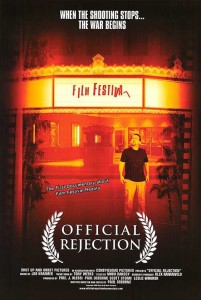‘Official Rejection’ Spotlights Film Festival Circuit
Posted on April 4th, 2014 in Entertainment, Marketing, Movies with 0 Comments
Phoenix Film Festival Reviews:
With the Phoenix Film Festival getting under way this week, I decided it was about time I screened Official Rejection (2009), writer/director Paul Osborne’s documentary that peeks behind the marquee of the festival circuit.
Screenwriter Osborne took his camera along as he and director Scott Storm hit the road to promote their 2006 thriller Ten ’til Noon. They foresaw a bright future ahead on the circuit. “We might as well have believed in Santa Claus,” Osborne says.
“The biggest misconception that filmmakers have about film festivals is they’re going to go there. They’re going to show their movie. Someone’s going to buy it. They’re going to have a million dollars. And they’re going to have a great career,” Chris Gore, author of the Ultimate Film Festival Survival Guide, tells the camera. “And it’s not that.”
To underscore the point, Gore sits for the interview wearing a T-shirt that proclaims: “YOUR MOVIE SUCKED ANYWAY.” Indeed, Official Rejection tackles its subject with wit and a healthy dose of gallows humor. Those interviewed include not only director Kevin Smith and actress Jenna Fischer (The Office) but also porn-turned-B movie actress Traci Lords, Hollywood gadfly Andy Dick and prolific B movie producer Lloyd Kaufman (The Toxic Avenger).
From the very start, Osborne and Storm encounter the hurdles facing independent filmmakers hoping to screen their work:
- Lack of connections – Despite giving lip service to showcasing new voices in independent film, several of the best-known festivals have been effectively co-opted by The Man – rather, the movie industry with all of its agents, executives and financiers. Thus, many of the films that get the attendant media buzz really aren’t quite independent.
- Costs – Almost all film festivals levy non-refundable submission fees ranging, approximately, from $50 to $200. The filmmakers also must pay for press kits and screening copies of the movies. Few festivals cover the full cost of travel. Most expect filmmakers to bring their own promotional materials, and some want them to publicize the screenings. Osborne also points out the emotional and professional strains – time away from family and absence from so-called day jobs.
- Festival politics – “Which festival you play your movie at (or, rather, where you have your movie premiere) is the biggest issue in film festival politics,” Osborne says. Filmmakers face a Catch-22: Do they wait to hear from the elite festivals? Or do they commit to smaller festivals, which could make their films less attractive to the big guys? “What if you don’t get in?” asks Damon O’Steen, co-creator of 29 Reasons to Run (2006). “And then you’ve turned down other festivals that would’ve been an opportunity for a lot of other people to see your film.”
“You can’t hold onto the film too long,” says John Daniel Gavin, whose film Johnny Montana hit the circuit the same year as Ten ’til Noon. “You have to make a choice.”
It’s hard to know why a movie does or doesn’t make it into a festival.
“There are so many reasons why a film gets rejected that have nothing to do with the pure quality of it,” says producer Jacques Thelemaque. “They have programming objectives, or it may be a length thing. And then it is very subjective: [Maybe] it just doesn’t strike whoever is making the decisions.”
So why would filmmakers put themselves through this?
“Of all the things we’d been struggling to achieve with our movie, the most important was finding our audience,” Osborne says. He illustrates that elusive connection with Justin Hoffman, a guy the filmmakers meet while trying to promote Ten ’til Noon on the nearly deserted campus of the University of California, Riverside. He couldn’t make that evening’s screening at the Riverside International Film Festival but showed up a month later to see the movie at the San Fernando Valley International Film Festival. And, later, when the movie plays at the Newport Beach Film Festival, Hoffman shows up again and brings friends.
“If you can make a personal connection with audiences, you can do pretty well,” says Jordan Marsh, a programmer for the Newport Beach festival.
Film festivals are like trade shows, Osborne tells us. Attending them is a way to build credibility and publicity; generate reviews and feedback; and, in some cases, win an award.
“It’s all part of building a pedigree for a film,” says Patrick Ewald, a foreign sales rep. “That, in a sense, becomes like having … an A-list star – because to the distributors it says: ‘Okay, I have a theatrical movie.’”
Ultimately, Osborne and Storm chose to premiere Ten ’til Noon where they were wanted: the San Francisco Independent Film Festival.
“Although they were small and off the beaten path of the business, they had a reputation for quality films,” Osborne says. Still, he and Storm arrived to find that their screening was at a secondary venue on a side street. They had to engage in a day of sidewalk marketing to gin up their own audience.
As the documentary follows Ten ’til Noon around the circuit, it shows how a festival scene can be very good, very bad and something in between.
The Phoenix Film Festival comes across as a positive experience – larger, better organized and less political than some others. Perhaps that’s why Osborne chose it last year for the world premiere of his next film, FAVOR, which won the Best Screenplay award. Storm’s We Run Sh*t took home last year’s Copper Wing Award for best documentary.
This year’s Phoenix Film Festival opened last night with the movie Locke, starring Tom Hardy (Inception, The Dark Knight Rises) and Ruth Wilson (The Lone Ranger, Saving Mr. Banks).
Screenings really crank up today and continue through April 10. The Closing Night feature is Boyhood, which captures 13 years in the life of a boy named Mason (Ellar Coltrane) and his parents, played by Ethan Hawke and Patricia Arquette.
Films I would like to see include:
- Jake Squared, about a man re-examining his life through the making of a movie. It stars Elias Koteas (Combat Hospital), Jennifer Jason Leigh, Virginia Madsen and Jane Seymour. The cast also includes 18-year-old Liana Liberato, who stole every scene in which she appeared in last year’s Closing Night feature, Stuck in Love.
- God’s Pocket, directed by Mad Men actor John Slattery, is a caper movie with an all-star cast including the late Philip Seymour Hoffman, Christina Hendricks (Slattery’s Mad Men costar), Richard Jenkins, Caleb Landry Jones and John Turturro.
- Teddy Bears, a dark comedy, stars David Krumholtz (Numb3rs, Serenity) as a young man mourning the death of his mother who asks his closest friends to join him in a orgy that he believes will be therapeutic.
- Dom Hemingway, a caper film staring Jude Law, Emilia Clarke (Game of Thrones) and Demian Bichir (A Better Life, The Bridge).
- Words and Pictures, in which a romantic comedy about an English teacher (Clive Owen) and an art teacher (Juliette Binoche) who debate the relative power of language vs. image.
This year’s festival also features a Saturday “Teen Night” double feature: Clueless (1995) and Perks of Being a Wallflower (2012). The latter stars Logan Lerman, who also was in last year’s Stuck in Love, along with Emma Watson (Harry Potter, The Bling Ring).
Of course, another aspect that makes the Phoenix Film Festival stand out among others is its incorporation of the International Horror & Sci-Fi Film Festival. Those films tend to screen later in the evening. This year I hope to catch Oculus, a horror movie about siblings investigating the decade-old murder of their parents, and SOS: Save Our Skin, a sic-fi thriller about two men coping with being the last humans on Earth.
NOTE: Ten ’til Noon and Official Rejection are available on Netflix and Amazon. FAVOR hits Video On Demand April 22.
###
Stuart J. Robinson practices writing, editing, media relations and social media through his business, Phoenix-based Lightbulb Communications.
Tags: Boyhood, Dom Hemingway, Favor, Film Festivals, God’s Pocket, International Horror & Sci-Fi Film Festival, Jake Squared, Locke, Newport Beach Film Festival, Oculus, Official Rejection, Paul Osborne, Phoenix Film Festival, Riverside International Film Festival, San Fernando Valley International Film Festival, San Francisco Independent Film Festival, Scott Storm, SOS: Save Our Skin, Stuck in Love, Teddy Bears, Ten ’Til Noon, We Run Sh*t, Words and Pictures






COMMENTS
There are no comments yet.